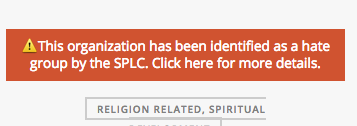
After the nonprofit accountability website GuideStar flagged 46 different nonprofits earlier this year as hate groups, trolls started harassing and threatening the company and its staffers. Now, citing concerns for employee safety, as well as unresolved questions over objectivity, GuideStar has removed the hate group labels.
When labeling the 46 nonprofits, Guidestar relied on reports from the Southern Poverty Law Center, a third party research and advocacy organization based in Alabama.
Guidestar initially introduced the labels to warn potential donors that they might be donating to known hate groups. The 46 organizations are a small fraction of GuideStar’s total 1.7 million listings and include the American Family Association and the Family Research Council, two Christian groups that oppose abortion and same-sex marriage; the Center for Immigration Studies, which wants to reduce immigration to the United States; and alt-right leader Richard Spencer’s National Policy Institute.
At least one of the flagged groups, Liberty Counsel, retaliated by asking its Twitter followers to attack GuideStar’s rating on Facebook.
Following months of such harassment, as well as meetings with representatives of those groups and a review of the Southern Poverty Law Center’s methodology, GuideStar CEO Jacob Harold announced Friday that GuideStar would be removing the hate group labels from the site.
The move met with what Harold called some “constructive” criticism online when it was initially rolled out in February, but in recent weeks “the tone shifted towards threatening,” Harold told BuzzFeed News. “There were specific incidents that really scared us as an organization.” For example, at a recent conference, an employee working at a GuideStar booth was harassed over the hate group issue in person, Harold said.
Harold told BuzzFeed News that most GuideStar employees are supportive of his decision, though he acknowledged that some oppose it. One current employee who spoke with BuzzFeed News on the condition of anonymity described feeling frustrated with the situation.
“Given the extremely rapid turnaround of GuideStar's position after media attention, I believe that GuideStar changed their stance because of intimidation,” this person said. “I am disappointed that threats are now an effective means of changing the stance of a nonprofit leader like GuideStar.”
In a statement to BuzzFeed News, SPLC spokesperson Wendy Via said the SPLC “appreciate[s] that GuideStar will continue to provide information as to whether the organizations they rank are designated as hate groups by the Southern Poverty Law Center. At a time when hate groups increasingly present a mainstream veneer, the public deserves such information.”
GuideStar will still tell users upon request which nonprofits have SPLC hate group designations. Assisting in that effort is independent coder Tom MacWright, who built a Chrome extension that reinstates the SPLC hate group warning on all 46 flagged organizations.
Concerns over objectivity were also a factor in Guidestar’s call to remove the labels. After meeting with some of the flagged groups’ leaders, Harold said he’s not sure that all 46 of the nonprofits in question should be considered hate groups. “We didn't find all of their arguments convincing, but you meet people and you understand nuances you hadn't caught at first,” he said.
For example, he said an organization’s designation as a hate group could be based on language or statements from the past that have since been softened. Or, in another instance, an organization that reprinted a hateful statement from an individual not employed by them might argue that the hate group designation is unfair.
“It’s an indication that they keep unsavory company, but does it make them a hate group?” Harold said. “I didn’t come away thinking hate groups were angels by any sense, but the question of whether 100% of the 46 deserve the title ‘hate group’ — that’s a really hard question.”
One example Harold gave is the Center for Immigration Studies, the founder of which recently defended his organization from the label in a Washington Post op-ed. The group circulates an email newsletter which has included links to articles by white nationalists and Holocaust deniers, but does not itself support those agendas, Politifact found. Ultimately, Harold felt the designation was more subjective than he’d initially realized. “We’re all going to draw the line as to what’s a hate group in different ways,” he said.
Another factor in Harold’s decision to pull the labels was GuideStar’s desire to remain neutral. GuideStar has over 8 million individual users, and it could alienate many of them if they perceived it to be partisan. “We had the benefit of being seen as not engaged in the political polarization that I would argue is haunting our country right now,” said Harold. “We were proud of the fact that organizations across the political spectrum were engaged with GuideStar.”
Harold said the removal of the hate group labels is a temporary decision. GuideStar may reinstate the labels on some groups, especially if the SPLC is able to share more information with the public about why certain organizations are labeled as hate groups, and provide guidelines for how those organizations can expunge their records. The two groups are continuing to work together on the issue. “Removing the flags isn’t a final decision,” he said.
Quelle: <a href="This Website Stopped Labeling Some Nonprofits As Hate Groups After A Public Backlash“>BuzzFeed






